The Language Lab
About us
The Language Lab is a hub for exploring how human language shapes and is shaped by history, community, culture, and technology.
Language is the ultimate social glue: it connects people, creates meaning, and reflects our nature as social beings.
At the Language Lab we investigate how languages are co-designed, understood, and used in context. Our work highlights the role of language in everyday life, tracking processes of change, multilingualism, and linguistic inequality. We are especially committed to research that is collaborative, decolonising, and grounded in the principle of linguistic gratuity—giving back to the communities whose languages we study.
The Lab also examines the rapidly evolving role of large language models (LLMs) and generative AI. We explore how these technologies intersect with human language, asking critical questions about inclusion, bias, and equity in their design and use. This research ensures that new tools support rather than erase linguistic diversity, and that technological innovation is guided by responsibility and respect for the people whose voices it engages.
Our members
- Associate Professor Celeste Rodríguez Louro (Director)
-
Associate Professor Celeste Rodríguez Louro is Director of the Language Lab, Linguistics Discipline Chair, and Australian Research Council fellow in Linguistics at The University of Western Australia (UWA). She has recently been awarded a highly competitive Visiting Fellowship to spend Hilary Term 2026 at All Souls College, University of Oxford (14% success rate). Celeste is Deputy Chair of UWA's Generative Artificial Intelligence (GenAI) Think Tank, Editorial Board Member for the Australian Journal of Linguistics, and area consultant to the Oxford English Dictionary. From 2022 to 2024, she presented the award-winning radio show Language Lab, a Linguistics segment on RTRFM 92.1. In 2025, Celeste was awarded the 2025 outreach prize by the International Society for the Linguistics of English (ISLE) for her linguistics outreach. Celeste works with the Heart Foundation to decolonise the production of medical media for First Nations communities. She has also partnered with Google on a project which will ensure inclusive technology for First Nations people in Australia.
Trained in Argentina, the USA and Australia, Celeste’s research tracks language change across time. Her work deals with macro sociolinguistic issues including standard language ideologies, language contact, and multilingualism. Underpinned by the sociolinguistic principle of linguistic gratuity (‘giving back’), Celeste is interested in decolonisation and in ways to create sustainable work and planetary health. Her recent focus is on making technologies inclusive and equitable, underscoring the crucial role of humans in creating language models. Celeste’s publications have appeared in high-ranking international journals. Her work has featured in more than 100 peer-reviewed conferences, including multiple invited international plenaries and panels. She has won several research and teaching awards and has a strong media presence, a testament to her commitment to making Humanities and Social Science available to a wide audience.
Celeste is currently writing, in collaboration with Nyungar scholar Dr Glenys Collard, a monograph titled ‘Variation and change in Aboriginal English’ – contracted to Cambridge University Press. This work is funded through a highly competitive Australian Research Council DECRA Fellowship (16% success rate).

- Alex Stephenson
-
Alex Stephenson is a PhD candidate within the broader ‘Life after Digitisation: Future-Proofing WA’s Vulnerable Cultural Heritage’ ARC Linkage project, which is digitising collections of language materials held at four Aboriginal language centres in Western Australia. Alex works with three of those language centres – Mirima Dawang Woorlab-gerring Language and Culture Centre, Kimberley Language Resource Centre, and Bundiyarra Irra Wangga Language Centre – where he explores post-digitisation futures. In particular, he examines how the perspectives of language centre communities and their representatives can inform processes for the storage, management, and sharing of these language collections in appropriate and context-specific ways.
Alex holds a Bachelor of Arts degree in Chinese Studies and Linguistics, with Honours in Linguistics, where he focused on typologically investigating reflexive expressions having lexicalised an emotional meaning in a sample of languages across Europe, Australia, and Asia.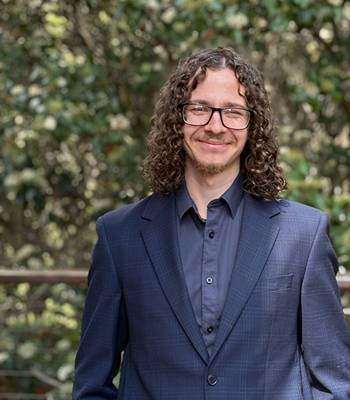
- Dr Amanda Hamilton-Hollaway
-
Dr Amanda Hamilton-Hollaway's research interests centre on language structure, language shift, and connections between the two.
While all languages change, those that are endangered can do so in ways that are particularly rapid and profound. Amanda works to describe the kinds of grammatical changes that minority languages undergo when they are in intense contact with larger, more socially dominant languages. She has been collaborating with speakers of Mudburra, a language of the central Northern Territory in Australia, since 2016, and she bases most of her investigations on the wealth of data that this partnership affords.
Amanda is interested in the practical as well as the theoretical implications of her research. In addition to authoring works for academic journals and conferences, she has helped create language resources for the Mudburra community such as storybooks, posters, and videos. She also co-authored the 2019 Mudburra to English Dictionary and co-designed a series of workshops for educators on how to incorporate this dictionary in the local school curriculum.

- Dr Ben Hutchinson
-
Dr Ben Hutchinson is a senior researcher in Responsible AI at Google Research. His research includes learning from social sciences to inform the ethical development of AI, with a focus on making language technologies and their development more inclusive. He mainly publishes in the fields of Natural Language Processing and AI Ethics.
Before joining Google Research, Ben spent ten years working as a software engineer on a variety of Google products.
He has a B.A. Hons in Linguistics from the University of Sydney, and a PhD in Computational Linguistics from the University of Edinburgh.
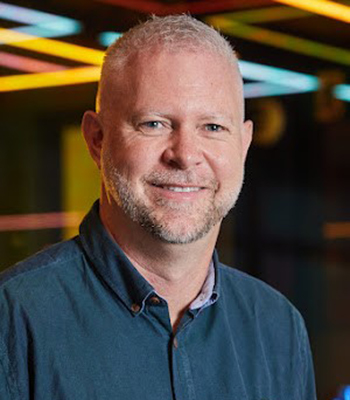
- Professor Clint Bracknell
-
Clint Bracknell is a Noongar song-maker, composer, and Professor of Music at The University of Western Australia (UWA).
He investigates connections between song, language, and landscapes while working on projects to improve Indigenous community access to cultural heritage collections.
Clint received the 2020 Barrett Award for Australian Studies and has co-translated world-first Indigenous language works in film and theatre. He serves as Deputy Chair of the Australian Institute of Aboriginal and Torres Strait Islander Studies (AIATSIS) Council and maintains a significant creative research agenda, leading development of the Mayakeniny Noongar performance resource and releasing music under the name Maatakitj. He is also a Fellow of the Australian Academy of the Humanities.

- Dr Connor Brown
-
Dr Connor Brown is a linguist at Mirima Dawang Woorlab-gerring Language and Culture Centre in Kununurra, WA, and an Adjunct Research Fellow in the Discipline of Linguistics at The University of Western Australia (UWA). He received his PhD in Linguistics from UWA in 2024 and is an affiliate member of the Centre for Australian Studies at the University of Cologne.
Connor’s research centres around the structural and social outcomes of language contact. He has extensive experience conducting remote fieldwork in the East Kimberley region of Western Australia and has been working with speakers of Northern Australian Kriol since 2019. Connor has a particular interest in the effect of language contact on the semantic/pragmatic domain. His research on various semantic and pragmatic phenomena in Australian contact varieties provides insight to this question.
A large part of Connor’s research is also informed by community collaboration. Since 2020 he has been working with Kriol speakers in the Kununurra region on various community-led projects. This includes the development of an orthography for varieties of Kriol spoken in the East Kimberley, and Kriol-medium resources for language revitalisation.
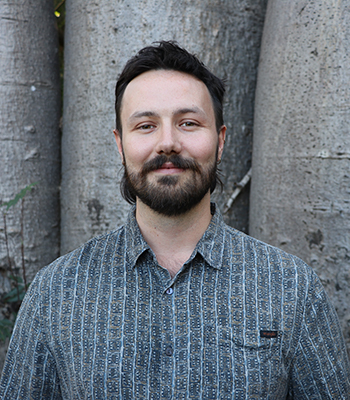
- Daniel Dennis Colbung
-
Daniel Dennis Colbung is a Menang Nyungar man from Albany, Western Australia. Daniel is currently studying a Bachelor of Science at The University of Western Australia. His hobbies include playing basketball, going to the gym, reading books, watching movies, listening to music and painting. Daniel is a Research Assistant on the Google-funded ‘Aboriginal English Voices’ project directed by Dr Glenys Collard and A/Prof. Celeste Rodríguez Louro.
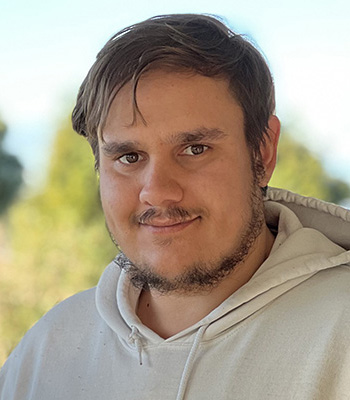
- Daniel Midgley
-
Daniel Midgley is a linguist, educator, and science communicator. He has taught thousands of students over his career at UWA and Edith Cowan University, and thousands more through his media outreach. He has designed and taught first- and second-year units in Linguistics and in Education, where he delivered the Educational Linguistics unit. Daniel received accolades for his teaching in 2007, when he was awarded a High Commendation in the UWA Excellence in Teaching Award. He frequently conducts classes in Linguistics for community members.
Daniel’s academic work is in computational linguistics, where he publishes in speech act theory, machine learning, pragmatics, conversational analysis, and human interaction and technology.
Daniel has extensive media experience. He was host of the linguistics podcast Talk the Talk which aired on RTRFM community radio for ten years, and is currently host of the Because Language podcast. He's also the voice of the Speakeasy on ABC Radio Perth 720, which airs on Thursday mornings at 6.50am.
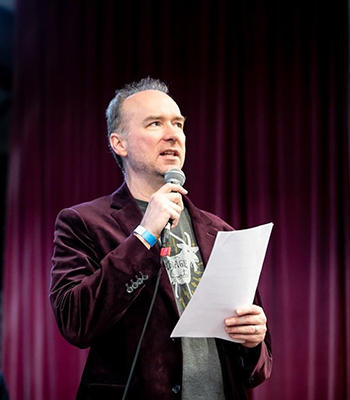
- Edie Maher
-
Language specialist Edie Maher works at Bundiyarra – Irra Wangga Language Centre. She has supported languages in the region for more than 20 years as a Wajarri language teacher. As a part of Edie’s role at Bundiyarra, she helps families by researching family connections and helping to build their family tree. She also focuses on developing educational language resources and materials.
Edie is a Nyungar, Palyku and Nyiybarli woman and grew up on Wajarri country in the Murchison area. She attended Tardun Station Mission and then school in South Fremantle, before attending Curtin University where she received her Bachelor of Education degree. Edie’s goal at Bundiyarra is to help maintain the nine languages and to support the language teachers using the languages.
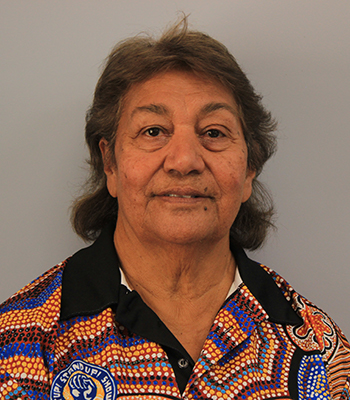
- Emily Gilchrist
-
Emily Gilchrist is a Research Assistant for the Google-funded ‘Aboriginal English Voices’ project, directed by Dr Glenys Collard and A/Prof. Celeste Rodríguez Louro. Emily completed a Bachelor of Arts (Honours) at The University of Western Australia in 2022, majoring in Linguistics and French. During her studies, Emily developed an interest in language variation and change, Australian Indigenous languages, and applied linguistics. Her interest in language education was furthered by a Work Integrated Learning (WIL) internship with the Department of Education in 2021.
Since graduating, Emily has spent time at Mirima Dawang Woorlab-gerring and the Kimberley Language Resource Centre, helping to prepare the centres’ archival materials for digitisation as part of the ARC Linkage ‘Life after Digitisation: Future-Proofing WA’s Vulnerable Cultural Heritage’ project. This involvement prompted Emily’s present enrolment in a Graduate Diploma in Archives and Records Management at Curtin University. Emily hopes this degree will strengthen her understanding of culturally responsive and sustainable management of linguistic data, especially in a digital environment.
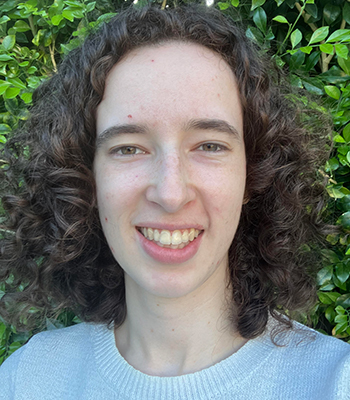
- Dr Glenys Collard
-
Dr Glenys Collard is a Nyungar scholar who has been working for and with the Nyungar people across WA for over 30 years. She is an Honorary Research Fellow in Linguistics at UWA and area consultant for The Oxford English Dictionary. Glenys has contributed extensively to understanding history, language and culture in Nyungar country and beyond. For her continued work in this space, she was inducted into the 2025 WA Women’s Hall of Fame. Glenys also received an Honorary Doctorate (Linguistics), which was conferred to her by UWA’s Chancellor in late July 2025.
Glenys was the first to record the Nyungar language with elders Mr Humphries and Mr Bennell and has chaired multiple state-level and national committees. She is a published author and has taught workshops to thousands of teachers and university students in WA.
Glenys is currently working with Associate Professor Celeste Rodríguez Louro (UWA) on several projects examining change and identity in Aboriginal English. She has recently collaborated with the Heart Foundation to produce two original medical videos fully scripted in Aboriginal English. Glenys is also director, with Associate Professor Rodríguez Louro, of the Google-funded project titled ‘Aboriginal English Voices’, which seeks to make voice-operated technology inclusive for First Nations people in Australia.
- Dr Jess Kruk
-
Dr Jess Kruk is a sociolinguist and lecturer in Indonesian Studies at The University of Western Australia (UWA). Her research focuses on identifying and addressing the exclusion of marginalised people from social, economic, and cultural life in Indonesia and Australia.
Jess’s current projects include an investigation of how ethnic minority groups are impacted by the movement of Indonesia's capital, an exploration of how extreme metal musicians in the Asia Pacific write 'metal' lyrics using non-English languages, reimagining and reinvigorating Indonesian language teaching, and enhancing language communication to fight prejudice in the general public.

- Katharina Froedrich
-
Katharina Froedrich is an international PhD student in Linguistics and a Forrest Research Foundation doctoral scholar.
Katharina holds a Bachelor and Master of Arts degree in English Linguistics from The University of Munich (LMU), and has a strong background in sociolinguistics, language contact, and pidgin and creole studies.
At UWA, Katharina’s PhD explores Aboriginal English spoken in the Pilbara using collaborative research methods. She is particularly interested in how language use varies depending on context, topic, and interlocutor. As part of her collaboration with the PKKP Aboriginal Corporation in Karratha, she interned with PKKP's Language Team in 2025. Katharina's research also investigates how First Nations people and communities use AI-operated technology for a more inclusive and socially just world. She is currently a member of the Social Committee at Forrest Hall and a member of the GRS HDR Student Consultative Committee at UWA.
- Katrina Cox
-
Katrina Cox (Kat) is a Koreng Nyungar woman who grew up on Yamatji Country in Geraldton. Kat received a Bachelor of Science (Biomedical Science) degree at Murdoch University in 2022. In 2023 she was accepted into the UWA Doctor of Optometry postgraduate course. Having left the course early in 2025, her experiences at UWA highlighted for Kat the many challenges faced by Aboriginal students in postgraduate studies and she is now very passionate about advocating for better pathways, support, and opportunities for these students so they can successfully complete their studies.
Kat is a Research Assistant on the Google-funded ‘Aboriginal English Voices’ project, directed by Dr Glenys Collard and A/Prof. Celeste Rodríguez Louro. The unique design of the project in having Aboriginal fieldworkers and Aboriginal-led data collection aligns with Kat’s belief in ‘Nothing about us without us’. It is her hope that this unique experience will help develop her own research skills and that the long-term outcomes of the project will have far-reaching benefits as AI and Automated Speech Recognition (ASR) become integrated into many facets of everyday life.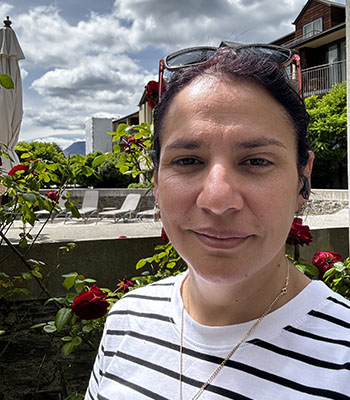
- Lily Hayward
-
Lily Hayward is a genderfluid, queer Nyungar yorga (woman) with ancestral connections all over Nyungar Country. They are studying a Bachelor of Arts, majoring in Linguistics, at The University of Western Australia. Lily hopes to integrate their studies of language with the mental health and social and emotional wellbeing of Aboriginal and Torres Strait Islander people. Lily is a Research Assistant on the Google-funded ‘Aboriginal English Voices’ project, directed by Dr Glenys Collard and A/Prof. Celeste Rodríguez Louro.
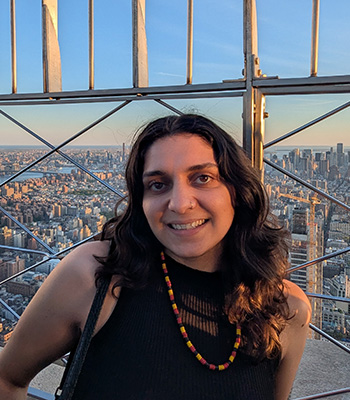
- Dr Lindsey De Witt Prat
-
Dr Lindsey DeWitt Prat is a Director of Research at Bold Insight, where she leads global research initiatives to help organisations understand how cultural and linguistic dynamics shape technology use. An interdisciplinary researcher, author, and translator with more than 15 years of experience bridging academia and industry, Lindsey brings cultural insights to projects spanning 25+ countries, with depth in Japan and East Asia. Her recent publications and speaking engagements focus on pathways to making AI more inclusive and culturally resonant through deep, contextual understanding of people and society.
Lindsey holds a PhD in Asian Languages & Cultures from UCLA and an MA in International Studies and Comparative Religion from the University of Washington. She is a board member at Ethnographic Praxis in Industry Conference (EPIC) and a Senior Fellow at the AI for Developing Countries Forum (AIFOD).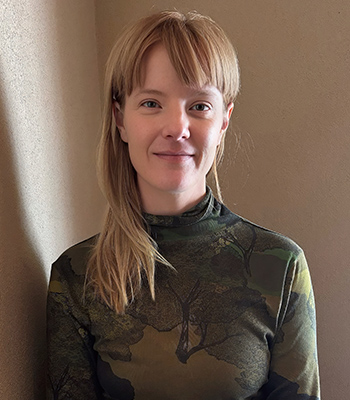
- Lucia Fraiese
-
Lucía Fraiese is a PhD candidate in Linguistics at The University of Western Australia (UWA), where she also works as a tutor and research assistant in Linguistics and the Language Lab. Her doctoral research, generously supported by a UWA University Postgraduate Award and an RTP Scholarship, is the first sociolinguistic ethnography to investigate how First Nations young women use language to create, contest, and maintain social bonds in boarding school settings. Through this work, Lucía challenges deficit-based perspectives on Australian Aboriginal English and youth language, which often disadvantage speakers in education, employment, and legal contexts. Her research highlights the social meaning of linguistic variation and its role in shaping students’ identities and social practices in school.
Lucía is a first-generation university student from the Global South, originally trained as an applied linguist and language teacher in Argentina. She has over a decade of teaching experience across secondary and tertiary institutions in Argentina, the United States, and Australia, and has worked extensively with students from diverse linguistic and cultural backgrounds. In 2016-2017, she was awarded a prestigious Fulbright Scholarship to advance her professional development in the United States. Since 2021, she has been based at UWA, beginning as a Higher Degree by Research (Honours) student investigating discourse-pragmatic variation in Australian English and Aboriginal English.
From 2022 to 2025, Lucía served as the Social Sciences student representative on the Board of Graduate Research at UWA. She has received numerous awards in recognition of her research, including a Graduate Women WA Child Development Scholarship, a UWA Convocation Award, and travel grants from Stanford University, the British Association of Applied Linguistics, and the Australian Research Data Commons. Most recently, she won the 2025 UWA Three Minute Thesis (3MT) competition.
Lucía is committed to socially impactful research that serves marginalised and minoritised communities. Her key interests include linguistic variation and social meaning, language and identity, and ethnographic approaches in sociolinguistics.

- Dr Luisa Miceli
-
Dr Luisa Miceli is Lecturer in Linguistics at The University of Western Australia (UWA). She trained in Archaeology and Linguistics at the Australian National University prior to moving to UWA for her PhD. Her research program involves three interrelated strands: language evolution/reconstruction of the linguistic past, language processing in bilinguals, and Australian Indigenous languages. Her research on bilingual processing provides novel insights on mechanisms of language change which then inform reconstructions of the linguistic past. These insights are particularly relevant in understanding the history of languages that have evolved in predominantly multilingual contexts, such as the Indigenous languages of Australia. Luisa has also maintained a connection with Archaeology and collaborates on some interdisciplinary projects.
Luisa teaches across a wide range of units in the Linguistics major and is also in charge of the Work Integrated Learning program, which gives Linguistics students the opportunity to gain valuable experience as professional linguists in different organisations, including community language centres, the WA Department of Education, and RTRFM radio. She has established a collaboration with Bundiyarra Irra Wangga Language Centre, jointly supervising Honours students working on community-led projects for their dissertation.
Luisa is a Member of the Australian Institute for Aboriginal and Torres Strait Islander Studies (AIATSIS) and a consultant for the Oxford English Dictionary, advising on etymologies that have origins in Australian Indigenous Languages.
- Dr Madeleine Clews
-
Born in Canada, Dr Madeleine Clews completed her Bachelor of Arts (Honours) at the University of Saskatchewan where she focused on Old English, Middle English, Old Norse and the History of English under the tutelage of Professor Richard Harris. She completed a D.Phil. qualifying year at Linacre College Oxford in 1984, mentored by Vigfússon Reader in Norse Antiquities Ursula Dronke, before taking a gap year to travel to Australia.
The ‘gap’ ended up lasting for nearly 30 years, during which Madeleine forged a career working as journalist for ABC and eventually spent more than a decade managing corporate communications for various state Government agencies. She left the public service to return to academia in 2019, completing her PhD in Linguistics, focusing on historical sociolinguistics and dialectology, with a particular focus on English in Western Australia.
Madeleine’s post-doctoral research is concerned with developing a corpus of Late Modern English ego-documents representing post-colonial varieties including Australian, Canadian and Singapore English.
- Dr Maïa Ponsonnet
-
Dr Maïa Ponsonnet is a Researcher at the Centre National de la Recherche Scientifique (CNRS, Dynamique Du Langage, Lyon), and an Adjunct with UWA’s School of Social Sciences.
Maïa’s research concerns expressive language, how emotions are linguistically encoded across the world’s languages, and whether emotional language may channel people’s experience and management of emotions. She has extensive experience working with speakers of Indigenous Australian languages in northern Australia, including Dalabon, Rembarrnga, Kune, and Kriol, all spoken in central Arnhem Land and around the town of Katherine.
Maïa is the author of many articles and books, in particular a 2014 monograph on the encoding of emotions in Dalabon (Gunwinyguan, northern Australia) and a 2020 monograph on a comparison between Dalabon and Kriol, the creole that has replaced Dalabon.

- Rosie Sitorus
-
Rosie Sitorus is a linguist with 11 years of experience working with languages in the Midwest, Gascoyne, and Pilbara regions of Western Australia (WA).
Rosie has worked in various roles at the Bundiyarra - Irra Wangga Language Centre, first as a linguist, then as a consultant, and finally as manager. She has worked mostly on Wajarri, Badimaya, and Thiinma/Warriyangga languages, although she has also engaged with Malgana, Nhanda, Yinggarda, and Ngarlawangga.
Currently, Rosie is a freelance cultural program consultant working with communities in the Midwest, Gascoyne and Pilbara. Previously, she was the language program specialist at the Puutu Kunti Kurrama and Pinikura Peoples Aboriginal Corporation (PKKPAC), where she incorporated her linguistic, strategic, management, and coordination experience into a new role of establishing a PKKP languages program, one of only a few Prescribed Body Corporate (PBC)-based language programs in WA.
Rosie is also an artist – a musician, poet, and storyteller. Since 2019, she has worked with Thiinma Elder Mr Peter Salmon on a songwriting project, 'Warralgurniya'. Rosie has travelled across WA with Mr Salmon and his band, performing songs written in Thiinma language.
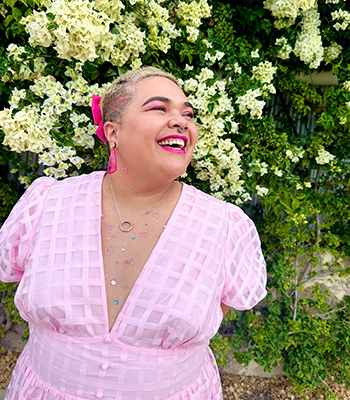
- Sharon Davis
-
Sharon Davis (they/them) is a non-binary Bardi and Kija person from the Kimberley in Western Australia and is the inaugural CEO of the National Aboriginal and Torres Strait Islander Education Corporation. With education degrees from University of Notre Dame Broome and University of Oxford, they have worked for more than a decade in First Nations education, leading key initiatives at both national and state levels. Sharon currently serves on the boards of Reconciliation Australia and the Aurora Education Foundation and is an Honorary Research Fellow at The University of Western Australia.

- Professor Umberto Ansaldo
-
Umberto Ansaldo is Professor of Linguistics and Dean of the College of Arts and Sciences at Vin University, Hanoi. As a linguist, Umberto specializes in research on languages of Asia from a comparative and historical perspective. His publications advance an evolutionary framework of language contact that highlights the role of multilingualism and variation in language change. He has also worked in language documentation and researched endangered contact languages of the Indian Ocean.
As an educator, Umberto has long promoted a student-centred, innovative, and interdisciplinary pedagogical philosophy. In his role as Dean, he represents a governance style that emphasizes meritocracy and transparency and fosters a culture of empathy and belonging. In his spare time, Umberto enjoys wining and dining and the practice of martial arts. Prior to moving to Vietnam, he lived and worked in many places, including Amsterdam, Singapore, Hong Kong and Australia.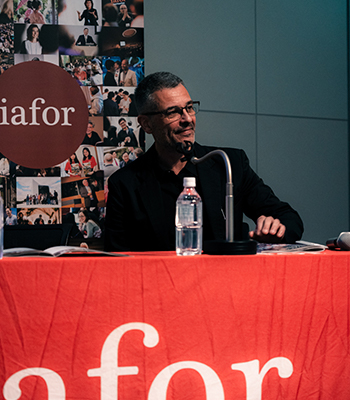
Work with us
Scholars interested in researching language and linguistics may join existing projects or propose their own with input from supervisors. Prospective researchers must be willing to complete a PhD by publication. If you would like to get involved, please get in touch through the details below.
Articles in The Conversation
- The unspoken rule of conversation that explains why AI chatbots feel so human
- AI systems are built on English – but not the kind most of the world speaks
- Generative AI is not a ‘calculator for words’. 5 reasons why this idea is misleading
- Adolescence has sparked fears over teen slang – but emoji don’t cause radicalisation
Podcast
Publications
Quotation in earlier and contemporary Australian Aboriginal English
Language Lab Director, A/Prof Celeste Rodriguez Louro, has just had a major ARC DECRA output, an article titled 'Quotation in earlier and contemporary Australian Aboriginal English' published in top linguistics journal Language Variation and Change (Cambridge University Press). This work shows that Aboriginal English is significantly different from mainstream Englishes, including Australian English. This is the first-ever article on Australian Aboriginal English published in this major international journal and the first work co-authored with a First Nations scholar -- Nyungar scholar Glenys Collard.
Celeste is now working on a sequel paper where First Nations youth are further evidenced to sustain traditional cultural frameworks in the face of relentless globalisation.
Projects
- Aboriginal English in the Global City: Minorities and language change
-
The Aboriginal English in the Global City: Minorities and language change project, funded through an Australian Research Council DECRA Fellowship to A/Prof. Rodríguez Louro, examines how Aboriginal English is used and how it is changing.
Learn more about this project in a Research Impact Story, 'Aboriginal English: It's all in the yarning'. - Aboriginal English Voices
-
Automation and voice interactions can make life easier, but First Nations people struggle because the existing technology does not accurately recognise and understand their speech. This project is the first to support First Nations people in Australia by allowing them to use Aboriginal English, the variety of English spoken by 80% of First Nations people in Australia, when interacting with technology. It squarely addresses lack of inclusion in Google's Automated Speech Recognition products such as voice search, video search, message dictation, automated captioning, and speech APIs. To achieve this, the partnership will build rich datasets of Aboriginal English using culturally appropriate processes and protocols.
To achieve these outcomes, Google has partnered with A/Prof. Celeste Rodríguez Louro, Director of UWA's Language Lab. The Language Lab will be responsible for culturally appropriate data management and collection, and for setting up culturally appropriate data governance. A Steering Committee made up of a majority of First Nations people has been established to oversee the project.
This sponsored research project will demonstrate leadership in showing how academic and tech company partners can work ethically with First Nations communities and their data. We will share best practices and deliver more inclusive technologies.
This partnership builds on A/Prof. Rodríguez Louro's and Dr Glenys Collard's longstanding collaboration. In addition to strengthening UWA as an internationally recognised hub for the study of Aboriginal English, First Nations languages and cultures, and decolonial linguistic practice, this project will create rich opportunities to train and build capacity for promising First Nations youth across Australia. These youth will be hired as research assistants, fieldworkers, and where appropriate recruited as Honours / HDR students. The project will also provide employment opportunities for First Nations consultants, scholars, and communities. - Decolonisation, diversity, and inclusion in academic research
-
A decolonial approach to academic research is key to ensuring that work with people of minoritised backgrounds is actively reparative or, at the very least, inflicts the least possible harm. Working with minoritised communities raises important questions about inequality and privilege because settler colonialism is a structure, rather than an isolated event, and because the structure of settler colonialism is steeped in histories of dispossession and cultural erasure.
This project explores the use of participatory research models, including cross-cultural co-design, which, we argue, offer the best possible candidate to begin to decolonise academic research. These questions have recently received attention in Dr Glenys Collard’s and A/Prof. Rodríguez Louro’s publication titled ‘Working together: Sociolinguistic research in urban Aboriginal Australia’ which was published in Journal of Sociolinguistics in 2021 and in the Language on the Move blog piece ‘Decolonising sociolinguistic research’. - Decolonising the Introductory Linguistics Curriculum
-
Too often, introductory linguistics courses unintentionally present languages as unitary and unchanging. Students are, for example, only asked to analyse data from a single ‘standard’ variety; data from minoritised varieties, non-native speakers, deaf language users, and neurodiverse populations is either not presented or is reserved for ‘variation’ or ‘pathology’ sections. Additionally, the voices of diverse language users themselves rarely feature directly in introductory courses.
This unintended bias toward the speech of ‘ideal native speaker-hearers’ results in students receiving an inaccurate picture of language in use. To combat this, we are restructuring the introductory linguistics units offered at The University of Western Australia, changing their content and approach so they more accurately reflect the complex linguistic reality of our world.
This project is funded by a 2023-2024 Modern Language Association Humanities Innovation Grant to A/Prof. Celeste Rodríguez Louro and Dr Amanda Hamilton-Hollaway. - Domestic uses of fire in past and present Australia: What language can tell us
-
Bringing together linguists, First Nations language experts, and archaeologists, this project innovates a style of collaboration where language knowledge and lexicography play a pivotal role in understanding Australian cultures past and present. The project explores an under-researched aspect of Australian Indigenous life: domestic uses of fire. Despite their cultural centrality, everyday practices and techniques around fire in ‘camps’ (i.e., hearths) have not been systematically documented, perhaps because they typically pertain to traditionally ‘female’ knowledge. Building upon a pilot study that involved 10 Australian languages, this project investigates an additional 30 languages from across the continent, extracting frequent lexical categories for functions and techniques related to fire, including potential regional contrasts and historical developments.
This project is funded through a 2022 Australian Linguistic Society Research Grant, and carried out by Dr Luisa Miceli in collaboration with Dr Maïa Ponsonnet (Laboratoire Dynamique du Language, CNRS), Dr Ingrid Ward (Archaeology, UWA) and Dr Emilie Dotte (Archaeology, UWA).
- Heart Foundation
-
Glenys Collard and A/Prof Celeste Rodriguez Louro are working with the Heart Foundation in the production of medical videos fully scripted in Aboriginal English. To learn more about this project, read their article 'Yarns from the heart: the role of Aboriginal English in Indigenous health communication'.
Watch the videos here:
This work has recently been nominated for a Health Consumer Excellence Award – for excellence in the provision of health services to Aboriginal and Torres Strait Islander health consumers.
- Monitoring as a driver of differential language change
-
When languages share speakers, one observed outcome is that their vocabulary differentiates while their structure converges. A monitoring process in bilingual speakers has been proposed as the mechanism responsible for vocabularies becoming more distinct over time. Words shared across a bilinguals’ languages are selected less often than language distinctive words because they are ambiguous in their language membership and may be avoided in favour of an unambiguous synonym. Could monitoring also explain convergence in structure? In this study we test the hypothesis that different change outcomes for form/structure result from differences in a bilingual’s ability to monitor for these two levels.
This project is funded by an ARC Centre of Excellence for the Dynamics of Language Transdisciplinary and Innovation Grant, and carried out by Dr Luisa Miceli in collaboration with Professor Paola Escudero (Western Sydney University), Dr Bethwyn Evans (Australian National University), and Dr T. Mark Ellison (Universität zu Köln).
- Oxford English Dictionary
-
Dr Glenys Collard, Dr Luisa Miceli and Language Lab Director A/Prof. Celeste Rodríguez Louro are consultants to the Oxford English Dictionary. They are working on updating entries for Aboriginal English and for original Australian languages. The Aboriginal English entries have been updated to reflect ways in which Aboriginal English can be weaponised (i.e. used against) Aboriginal English speakers, especially in non-Indigenous contexts, such as schools and legal settings.
Listen to a lecture by Dr Glenys Collard and A/Prof. Rodríguez Louro, delivered as part of the Oxford World English Symposium 2022. - Sustainability in Academia
-
he climate crisis is forcing us to reconsider how we live and work. The Language Lab believes in ethical, sustainable, and collaborative practice for the benefit of our planet, and ourselves. Lab Director A/Prof. Rodríguez Louro and Dr Luisa Miceli together with former colleagues created a Working Proposal which outlines how we might engage in sustainable academic work.
A/Prof. Rodríguez Louro moderated an online panel in 2020 and recently delivered a keynote presentation titled ‘Sustainable Linguistics: Inclusion, collaboration and making our field a safer place’.
She also recently wrote an invited contribution to the Helsinki sustainability blog.
- Variation and change in Australian Aboriginal English – contracted to Cambridge University Press
-
Dr Glenys Collard and A/Prof. Celeste Rodríguez Louro are currently writing a book for the Language Variation and Change Series edited by Professor Sali Tagliamonte,Cambridge University Press. The book is titled ‘Variation and change in Australian Aboriginal English’. Keep an eye out for updates.
In the meantime, read an article written by Dr Glenys Collard and A/Prof. Celeste Rodríguez Louro about Aboriginal English.
- Work Integrated Learning
-
The Language Lab is pleased to host Ms Charlotte Yeung who is currently completing a Work Integrated Learning unit in Linguistics in collaboration with RTRFM 92.1 radio. Charlotte is working with the Lab Director on producing Language Lab, a weekly segment on The Agenda, RTRFM 92.1.
Past interns include Ms Lydia Tan (2022), Billie Pitman (2023), and Grace Shepherd (2023).
Upcoming events
2026 Conference of the Australian Linguistic Society
1-4 December 2026The University Club of Western Australia, UWA Perth Campus
Language Lab is hosting the 2026 Conference of the Australian Linguistic Society. The date has been confirmed for 1-4 December 2026 at The University Club of Western Australia, UWA Perth Campus. We look forward to seeing you there!
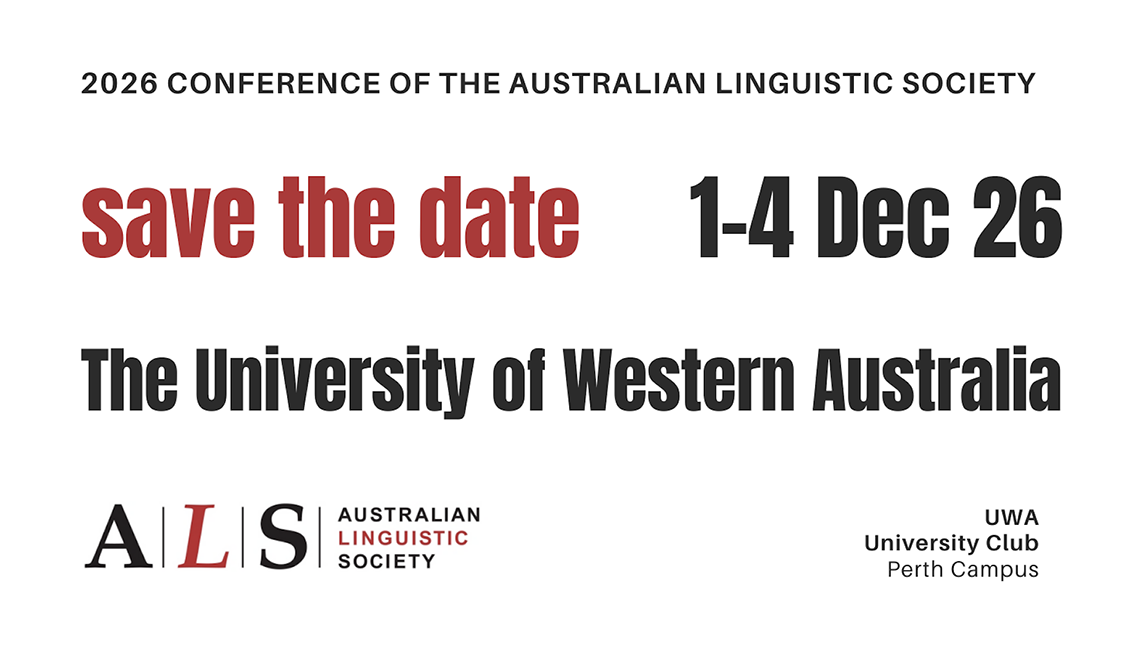

Oxford–UWA GenAI in Academia Series
Launch Seminar
Thursday 4 December 20258–10am Oxford time (BST) / 4–6pm Perth time (AWST)
Online via Zoom
UWA’s Gen AI Think Tank and Oxford’s AI Competency Centre
invite you to the launch of a new collaborative series exploring the
opportunities and challenges of generative AI in higher education.
News
A partnership with Google to improve speech technology for Aboriginal and Torres Strait Islander people's voices
A first-of-its kind partnership in Australia that aims to build a high-quality Aboriginal English speech dataset to improve speech technology.
Automating silence?
Read A/Prof. Celeste Rodríguez Louro's article on why artificial intelligence's inability to understand silence as a form of communication poses significant challenges.
Yarning for change

Discover how A/Prof. Celeste Rodríguez Louro and Dr Glenys Collard, in partnership with the Heart Foundation, have crafted two powerful heart health videos, fully scripted in Aboriginal English, in a whole new approach to First Nations-based health marketing campaigns.
Research Collaboration Agreement with Puutu Kunti Kurrama and Pinikura Aboriginal Corporation

UWA's Language Lab has just signed a Research Collaboration Agreement with Puutu Kunti Kurrama and Pinikura Aboriginal Corporation (PKKP) for participatory research on the languages of the Pilbara.
Projects carried out in the context of this collaboration seek to provide economic, professional, and social opportunities and benefits to Aboriginal collaborating partners, by promoting sustainable Indigenous culture and language in remote communities and engagement between Indigenous knowledge and Western science.
The research will place First Nations interests and expertise front and centre, contribute insights into patterns of language variation and change, facilitate a better understanding of the linguistic practices of First Nations people, and paint a more extensive picture of Australia’s current linguistic landscape.
PhD candidate and Forrest Scholar Katharina Froedrich will be the first UWA researcher to conduct fieldwork in the context of this Agreement for her project titled 'Aboriginal English in the Pilbara', with fieldwork commencing in early 2025.












